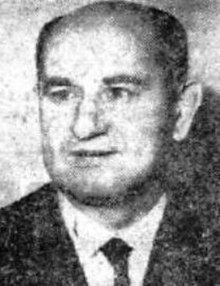Mika Špiljak
This article needs additional citations for verification. (August 2020) |
Mika Špiljak | |
|---|---|
 Mika Špiljak in 1967 | |
| 5th President of the Presidency of Yugoslavia | |
| In office 15 May 1983 – 15 May 1984 | |
| Prime Minister | Milka Planinc |
| Preceded by | Petar Stambolić |
| Succeeded by | Veselin Đuranović |
| 2nd Member of the Presidency of Yugoslavia for SR Croatia | |
| In office January 1983 – 15 May 1984 | |
| Preceded by | Vladimir Bakarić |
| Succeeded by | Josip Vrhovec |
| President of the Council of Peoples of the Federal Assembly | |
| In office 1969–1974 | |
| Succeeded by | Post abolished |
| 21st President of the Federal Executive Council | |
| In office 16 May 1967 – 18 May 1969 | |
| President | Josip Broz Tito |
| Preceded by | Petar Stambolić |
| Succeeded by | Mitja Ribičič |
| 4th President of the Executive Council of SR Croatia | |
| In office June 1963 – May 1967 | |
| President | Jakov Blažević |
| Prime Minister | Dragutin Haramija |
| Preceded by | Zvonko Brkić |
| Succeeded by | Savka Dabčević-Kučar |
| 10th President of the League of Communists of Croatia | |
| In office 1984–1986 | |
| President | Ema Derossi-Bjelajac |
| Prime Minister | Ante Marković |
| Preceded by | Josip Vrhovec |
| Succeeded by | |
| 31st Mayor of Zagreb | |
| In office 1949–1950 | |
| Preceded by | |
| Succeeded by | |
| Personal details | |
| Born | 28 November 1916 Sisak, Croatia-Slavonia, Austria-Hungary |
| Died | 18 May 2007 (aged 90) Zagreb, Croatia |
| Nationality | Croatian |
| Political party | League of Communists of Yugoslavia (SKJ) |
Mika Špiljak (Serbo-Croatian pronunciation: [mîka ʃpîʎak] or [-ʃpîʎaːk]; 28 November 1916 – 18 May 2007) was a Croatian politician in the Socialist Federal Republic of Yugoslavia.
Early years[]
He was born in Odra Sisačka (part of Sisak), in the Kingdom of Croatia-Slavonia (present-day Croatia). His father Dragutin was a railway worker. Špiljak began working at the age of 16. He joined the Communist Party in 1938 and fought with Partisans during World War II.
Career[]
From 1949 to 1950, he was the mayor of Zagreb.
In 1963, Špiljak was appointed the Chairman of the Executive Council of Croatia and served until his 1967 appointment as the President of the Federal Executive Council, Yugoslavia's Prime Minister. He served in that capacity until 1969.
Špiljak opened the 1984 Winter Olympics.
Špiljak then served as President of the collective Presidency of Yugoslavia from 1983 until 1984. He was subsequently elected President of the Central Committee of the League of Communists of Croatia from 1984 until 1986.
Death[]
He died in 2007 at the age of 90.[1] He was cremated in Zagreb.[2]
In the 2000s (decade), German courts linked Špiljak to the assassination of Croatian emigrant Stjepan Đureković in 1983.[3] After the hearings in Germany, all the links connecting him to the assassination were dropped.
References[]
Further reading[]
- Klasić, Hrvoje (2019). Mika Špiljak, revolucionar i državnik (in Croatian). Naklada Ljevak. ISBN 9789533553177.
- 1916 births
- 2007 deaths
- People from Sisak
- People from the Kingdom of Croatia-Slavonia
- League of Communists of Croatia politicians
- Presidents of the Federal Executive Council of Yugoslavia
- Presidents of the Executive Council of the Socialist Republic of Croatia
- Mayors of Zagreb
- Recipients of the Order of the People's Hero
- Presidency of the Socialist Federal Republic of Yugoslavia members

